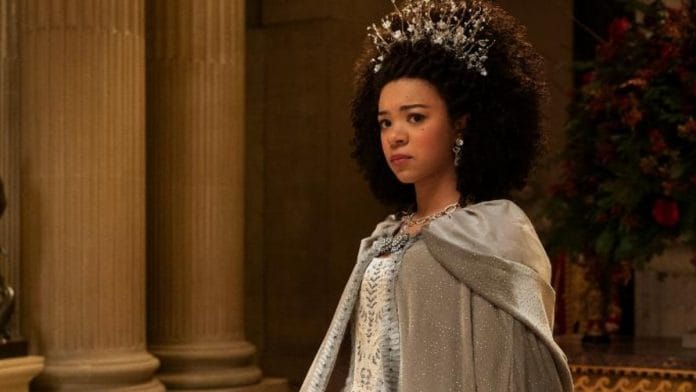Queen Charlotte: A Bridgerton Story is the best season yet of the wildly popular show even though it is a spin-off. The adaptation of Julia Quinn’s regency era novels has already become binge watch favourite with Bridgerton but with Queen Charlotte, Shonda Rhimes shows what she is truly capable of.
The six-episode-long first season keeps Bridgerton’s stylistic trademarks in place, from the classical covers of contemporary pop songs to Julie Andrews’ voiceover of Lady Whistledown. It travels back and forth from Charlotte’s present to 50 years in the past.
The show focusses on allyships and friendships within London’s high society. Some are even unlikely, but each is a reminder of how even a monarchy needs humaneness for its role-players to live somewhat of a fulfilling and authentic life. Be it the friendship between Lady Danbury (Adjoa Andoh), Violet Bridgerton (Ruth Gemmell), and Queen Charlotte (Golda Rosheuvel), or the allyship between Charlotte and Brimsley (Hugh Sachs), these bonds drive the narrative forward.
Race, monarchy, mental health
The union of a 17-year-old Charlotte played by India Amarteifio, and a freshly crowned King George III (Corey Mylchreest) takes place in the very first episode. Charlotte’s arrival in England occasions what courtiers call ‘The Great Experiment,’ which is bestowing titles, lands and privileges on select people of colour.
Their marriage touches on matters of race, mental health, bodily autonomy and, eventually, the meaning of desire and long-term partnership past middle age. These issues have come up time and again in Bridgerton’s last two seasons, be it Violet Bridgerton’s experience of finding love after marriage or the glimpses of the king struggling due to his mental health.
All issues are treated with due gravity without killing the fantasy. The intimate scenes in this spin off series are shown with much tenderness. Since the regency era did not see enough medical advancement to cure mental illnesses, the show portrays that helplessness with much sensitivity.
Charlotte’s struggle to be the queen of Britain is made much harder because of her race.
Rhimes also pointedly brings in elements of the royal family drama involving Meghan Markle. Despite the element of fantasy, it is also a telling reminder of how race is very much the most discriminatory practice in place in the monarchy. There is a reference to the news of Markle’s experience, as Princess Augusta comments on the skin colour of Charlotte.
Also read: Amazon Prime’s Citadel is an expensive misfire. Good actors, drone shots, terrible script
A season worth remembering
In terms of the cast’s performance, there are no missed steps. It’s almost a competition of who gets to be the best. India and Corey bring to screen the vulnerability of lovers brought together for the sake of politics. The crisis of being young monarchs in the world’s most powerful nation with its pitfalls are portrayed impeccably. India has more screen time and she does not waste even a second of it.
Arsema Thomas, who plays the young Lady Danbury has the gift of expressions. Her determination to open doors of opportunities for people is a delight to watch. It is she who makes the young Charlotte remember the power she has been given and to stop wasting her time wondering if George likes her.
The older cast members, Adjoa Andoh, Ruth Gemmell and Golda Rosheuvel are as good as ever in their initially hesitant, even suspicious bonding but one that slowly strengthens. The three actors almost make you forget that they might not be such close friends in real life.
There is also the relationship between the masters and their butlers. They are privy to their respective masters’ sorrow and secrets, and despite being in an unequal relationship, there is an understanding of sorts. Sam Clemmett as young Brimsley gives a performance stands out as he tries to do his duty by the crown while helping Charlotte get her place in the regime.
This is definitely a season to remember.






